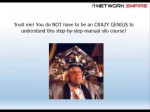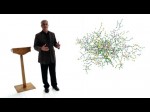
http://www.siloblogempire.com How to build a Wordpress SEO Silo Architecture with Free Plugins.

If You’re So Free, Why Do You Follow Others? The Sociological Science Behind Social Networks and Social Influence. Nicholas Christakis, Professor of Medical Sociology, Medicine, and Sociology at Harvard University If you think you’re in complete control of your destiny or even your own actions, you’re wrong. Every choice you make, every behavior you exhibit, and even every desire you have finds its roots in the social universe. Nicholas Christakis explains why individual actions are inextricably linked to sociological pressures; whether you’re absorbing altruism performed by someone you’ll never meet or deciding to jump off the Golden Gate Bridge, collective phenomena affect every aspect of your life. By the end of the lecture Christakis has revealed a startling new way to understand the world that ranks sociology as one of the most vitally important social sciences. The Floating University Originally released September 2011. Additional Lectures: Michio Kaku: The Universe in a Nutshell www.youtube.com Joel Cohen: An Introduction to Demography (Malthus Miffed: Are People the Problem?) www.youtube.com Steven Pinker: Linguistics as a Window to Understanding the Brain www.youtube.com Leon Botstein: Art Now (Aesthetics Across Music, Painting, Architecture, Movies, and More.) www.youtube.com Tamar Gendler: An Introduction to the Philosophy of Politics and Economics www.youtube.com

January 26, 2007 lecture by Bonnie John for the Stanford University Human Computer Interaction Seminar (CS 547). Bonnie has teamed up with Len Bass to bring usability to the architecture design table as a “first-class citizen” on par with other quality attributes like performance, security, and modifiability; she presents their research, proposed solution, and empirical results supporting the efficacy of that solution. CS 547 | Human-Computer Interaction Seminar: hci.stanford.edu Stanford HCI Group: hci.stanford.edu Stanford Center for Professional Development: scpd.stanford.edu Stanford University Channel on YouTube: www.youtube.com